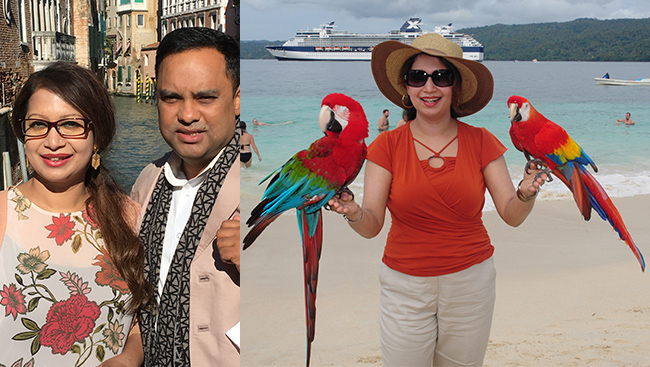“The culture, food, sports are all remarkably different; even the direction of road travel is opposite (in India we follow the British system). And we didn’t have a car at that time, so mobility was a challenge,” recalls Indra.
Indra Guha immigrated to Canada as an international student in August 2003 from Kolkata, India. His wife, Kasturi, came a year later. Back then, Indra had a bachelor’s degree in engineering and was employed with the largest organization in India, TATA Group.
He decided to go back to school to pursue MBA for career progression reasons, and was fortunate to be accepted in multiple universities in Canada and elsewhere. “Even though I didn’t have any friends or relatives in Canada at that time, I chose UBC Sauder School of Business to do my full-time MBA post-graduation because of the program’s reputation, financial reasons, and the international diversity of students in the MBA program,” says Indra. The other key reasons to choose Canada were the “country’s reputation as a nation that respects freedom and individual rights, welcomes immigrants, embraces differing races and cultures, and offers a high quality of living.”
Prior to his move, Indra thought of Canada as a huge country of picturesque mountain ranges and breathtaking natural beauty. On arrival, his first impressions were that of fresh crisp autumn air, seeing maple trees for the first time, and incredibly friendly and polite people. “But the real surprise was that every license plate of each car states ‘Beautiful British Columbia’ resounding how beautiful the province is. You don’t usually experience this pride in other places,” he shares.
The initial challenges that the family faced were that of loss of community, family and friends. “The culture, food, sports are all remarkably different; even the direction of road travel is opposite (in India we follow the British system). And we didn’t have a car at that time, so mobility was a challenge,” recalls Indra. Weather posed a serious issue too. “More than the rain, the longevity of the rainy days really surprised us as we never experienced this before,” mentions Kasturi. Since Indra came as an international student, the couple was also in the dilemma of deciding whether to stay or return back to India. It took them a while to get accustomed to the new surroundings but they encountered friendly and polite people which helped make the transition smoother.
Kasturi landed a good job within the first month of arrival which supported the family financially throughout Indra’s MBA program and even after. Indra however had a difficult experience. “When I graduated in 2005, most international students in our class were only offered a one-year work visa. It is crucially challenging to land a good job when your employer knows that you only have a one year work permit,” he states, who at present is the vice-president of commercial banking at RBC Royal Bank of Canada.

Overall the Guhas have had a fulfilling, challenging and gratifying journey in Canada. “There were moments of pain, frustration, glory and pure joy. We love the journey so far and are prepared for the inspirational road ahead,” expresses Kasturi. The couple likes the diversity, tolerance, reward for talent, natural beauty, and the long summer days with late sunsets Canada has to offer. “Also the Canadian passport allows us to travel to most places without a visa requirement; it makes travel plans easy,” they add.
In conclusion, Indra says it’s about how you view life; you can either regret or rejoice. He advises everyone to rejoice and share their joy. To sum up, he quotes a great message from American essayist Ralph Waldo Emerson: “For everything you have missed; you have gained something else, and for everything you gain; you lose something else.”
Biggest obstacle faced so far in Canada:
The biggest obstacle was to get the first meaningful job. It was specifically hard and challenging as the obstacle to secure the job was not due to anything else but the fact that international students (at that time) were at a serious disadvantage with only a one-year work visa. Adding to that challenge is how we can prove and demonstrate our qualities when we have practically no network and no one to support our efforts in a new land.
Resolutions made for yourself or family:
To work hard, be honest and practice humility. And always give back.
Advice for immigrants:
Migration involves loss. Even when you’re privileged and move on your own free will, as I did, you feel it. Migrants, almost by definition, move with the future in mind. Don’t be afraid to ask for help and always be open and eager to learn.
Memories of your homeland:
More than often, a mosaic of feelings overwhelms us. My sense of loss is primarily cultural. Our parents are back in India and the separation is afflictive. We also miss immensely the fresh, lip-smacking street food of Kolkata and the vibrancy of the city.





